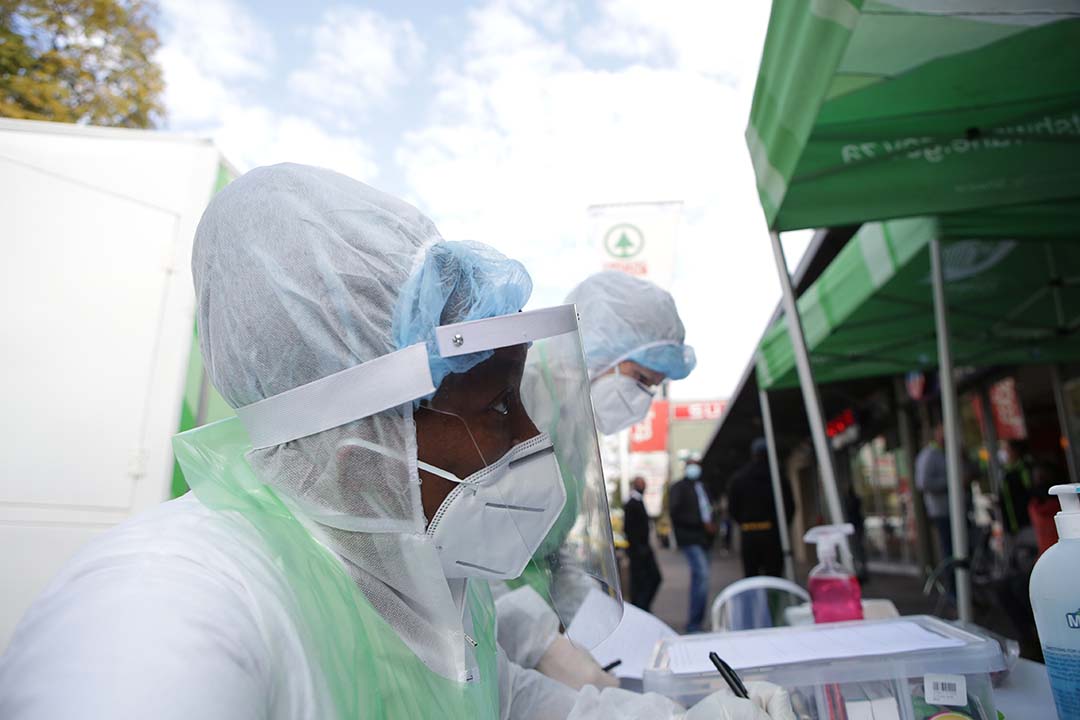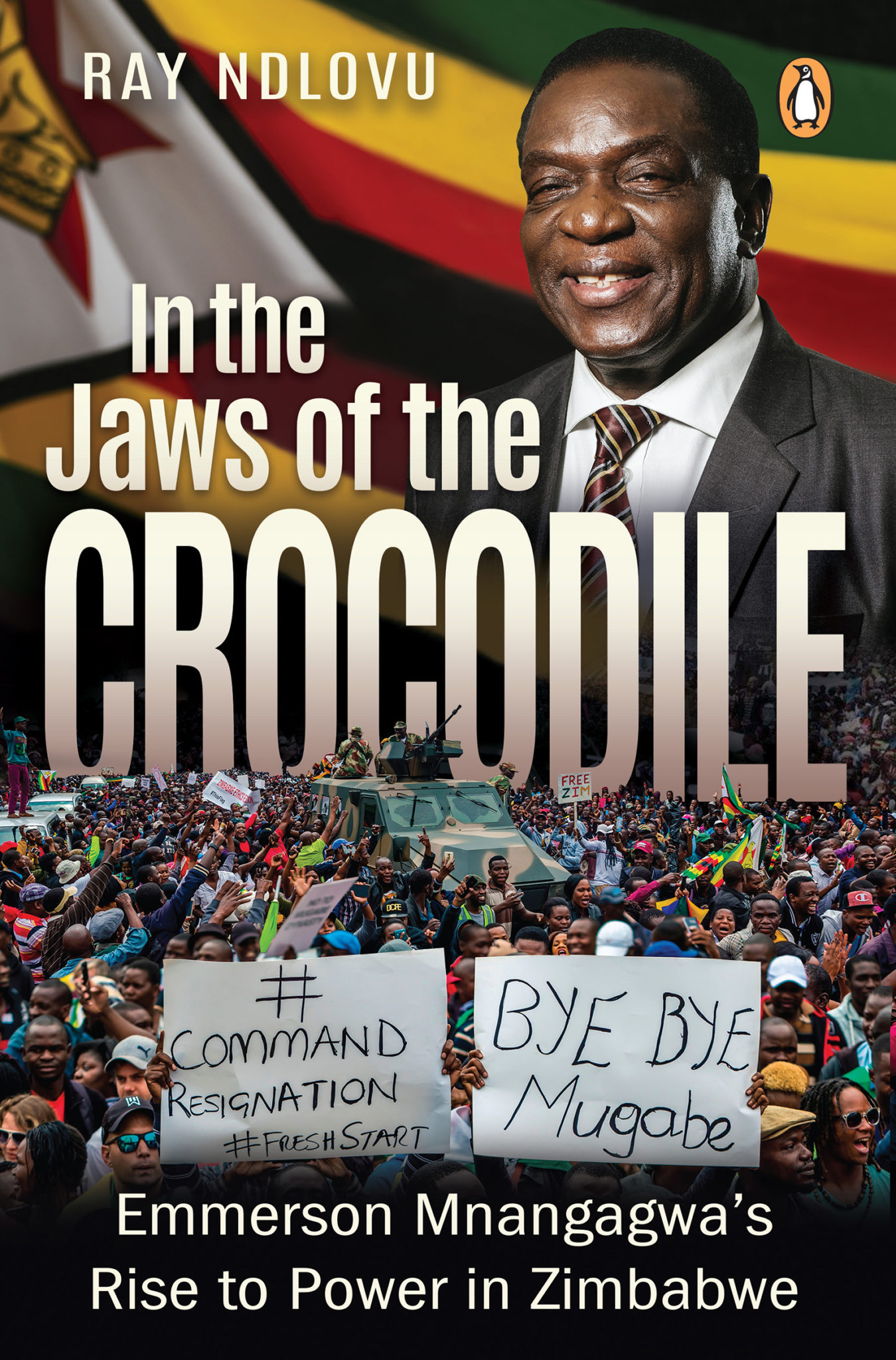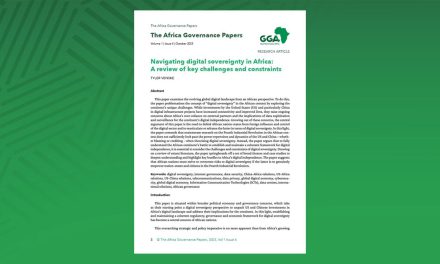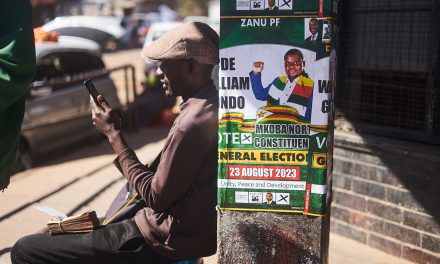When COVID-19 first struck, South African policymakers reacted promptly and implemented one of the world’s strictest lockdowns for five consecutive weeks. Despite that, and a slow release of the restrictions thereafter, the curve of infection rates has taken shape independently of economic lockdown interventions. By all accounts, those interventions have produced extensive opportunity costs and unintended negative consequences. But with infection rates on the rise, policymakers are confronted with having to make difficult decisions yet again.

City of Tshwane Health officials are seen during a testing drive for the COVID-19 coronavirus at the Bloed Street Mall in Pretoria Central Business District, on June 11, 2020. (Photo by Phill Magakoe / AFP)
The initial decision in March 2020 to impose a hard lockdown was relatively well received, but the subsequent formulation and implementation of regulations under the National Disaster Act has been haphazard at best. Perhaps the most stark manifestation of the economic impact is reflected in a R300bn shortfall in expected tax revenue. This amounts to nearly 30 percent of South Africa’s annual budget of over R1 trillion.
Key questions pertaining to COVID-19 governance responses also remain unanswered: Were the regulations pertaining to lockdown levels consistently implemented, or were they arbitrary and disproportionately unfair to the poor? Was lockdown warranted? Until these questions are addressed, policymakers may continue to devise and implement strategies with high opportunity costs and unintended negative consequences. For instance, HIV and TB testing rates have decreased during the last few months, raising the risk of more immune-compromised citizens dying than would otherwise have been the case, even as COVID-19 continues to spread.
Malnutrition has increased in the wake of deepening poverty, further compromising immune system health. In addition, thousands of children have missed their vaccinations as parents face increasingly stark choices between earning daily bread and taking their children to a local clinic. A resultant measles outbreak would result in far higher excess deaths than what COVID-19 has inflicted.
A critical dimension of these questions is how much freedom (and future health) citizens should be expected to sacrifice for the greater good, in the context of a pandemic. Logical criteria have to be formulated by which trade-offs are made to produce the least-worst long-run outcome. Only once these are established is public adherence to regulations likely to occur in good faith. Consistent, transparent and equitable interventions establish trust; autocratic and arbitrary impositions break trust, rendering interventions invariably counter-productive.
In this respect, it is important to think of COVID-19 not as a single global pandemic, but as a simultaneous outbreak of innumerable local epidemics, each one slightly different. Context-specific understanding of local dynamics really matters. Infectious disease outbreaks unfold differently in different communities, according to social conditions that only local people understand. A densely populated township has a different infection rate trajectory to a middle-class suburb, a village, a refugee camp or community of nomadic people. Therefore, it is particularly important for local communities to be fully involved in planning and implementing epidemic control measures.
Asia, Europe and North America all adopted much of the same epidemic control policy – some form of ‘lockdown’. African governments followed suite, but it is not clear that lockdowns were appropriate for our contexts. In South Africa, for instance, our deep societal inequalities – a function of our apartheid past – seem to not have been sufficiently considered. Social distancing is impractical for people sharing communal water and sanitation facilities, or living in high-density townships. Moreover, these are the same citizens whose livelihoods are made even more precarious by economic restrictions.
For most black communities, with people living from hand to mouth and reliant on earning cash in the market to buy food, a few days of lockdown can be the difference between survival and starvation. The measures taken to prevent the spread of the coronavirus exposed a wide range of systemic problems right across the continent, from water shortages to overcrowding to a lack of sanitation.
The largest impact of the pandemic was and still is felt by informal workers, through lockdown measures that limited or prevented them from working. The problem for informal traders starts with their means of travel to and from their working stations, as they rely heavily on public transport. The first people to experience police brutality from the lockdown imposition were informal workers. Enforcing these restrictions presents a significant challenge for the police: ethically, should they have rigidly enforced social distancing and other measures, or should they have been more cognisant and considerate of the local context?
The impact of lockdown regulations on the informal sector is just one example that raises the more significant, broader question of whether the government sufficiently considered the foreseeable economic and social consequences of its lockdown decisions. On a macro level, South Africa started the year with the economy in a technical recession, after the fourth quarter of 2019 saw a 1.8% quarterly decline on the back of a preceding 0.8% quarterly decline. GDP dropped by a massive 16.4% between the first and second quarter of 2020, and 5.2 million workers exited the workforce.
During an economic crisis, small businesses are the most vulnerable to collapse, as they have fewer resources with which to adapt to a changing context. The ITC COVID-19 Business Impact Survey, conducted from 21 April to 2 June 2020, revealed that in Africa two out of three businesses were negatively affected by COVID-19; 75% of respondents reported reduced sales and 54% had difficulty accessing inputs. While some service companies (i.e. software and internet based) have managed to thrive during the course of the pandemic, others have been hard hit. In hospitality and food services, 76% of surveyed firms said partial and full lockdown strongly affected their business operations.
In relation to the key questions pertaining to COVID-19 governance, the jury is still out on whether lockdown slowed the spread of the virus, while evidence is clear that it had a disproportionately detrimental economic impact on the poor and marginalised, who have no reserve cash flows to sustain themselves.
Ultimately, South Africa needs further fundamental reforms to achieve more robust and inclusive growth. Policies need to support marginalised communities through improved quality of education, health, transportation and an enabling business environment. In short, this requires improved governance at every level, something which the COVID-19 lockdown appears to have simply eroded.
This article was first published in Business Day here
Sixolile Ngqwala holds a Master of Commerce (MCom) in Economics from the University of Fort Hare, where he worked on the National Income Dynamics study (NIDS), based at the University of Cape Town, for Econometric research (econometric modelling, data coding, data mining, data analysis and interpretation). Sixolile has two BCom undergraduate degrees (in economics and in business financial management and industrial psychology). For his BCom Honours he majored in econometrics and economics. He has multidisciplinary skills, including an intersection of machine learning and data science (PYTHON and R-programming). Sixolile has background experience in natural resources, working with AngloGold Ashanti in the finance department. Later, he joined CNH-Industrial as a junior strategic developer and government relations. In 2019 he joined Good Governance Africa as a lead researcher, where he is responsible for quantitative and qualitative data management and statistical analysis on research projects relating to natural resources, land reform, and policy analysis, among others. At university he was involved in starting an academic society, New Economic Horizon, that fostered a working relationship between the Auditor-General’s office in the Eastern Cape and the University of Fort Hare’s accounting department.






